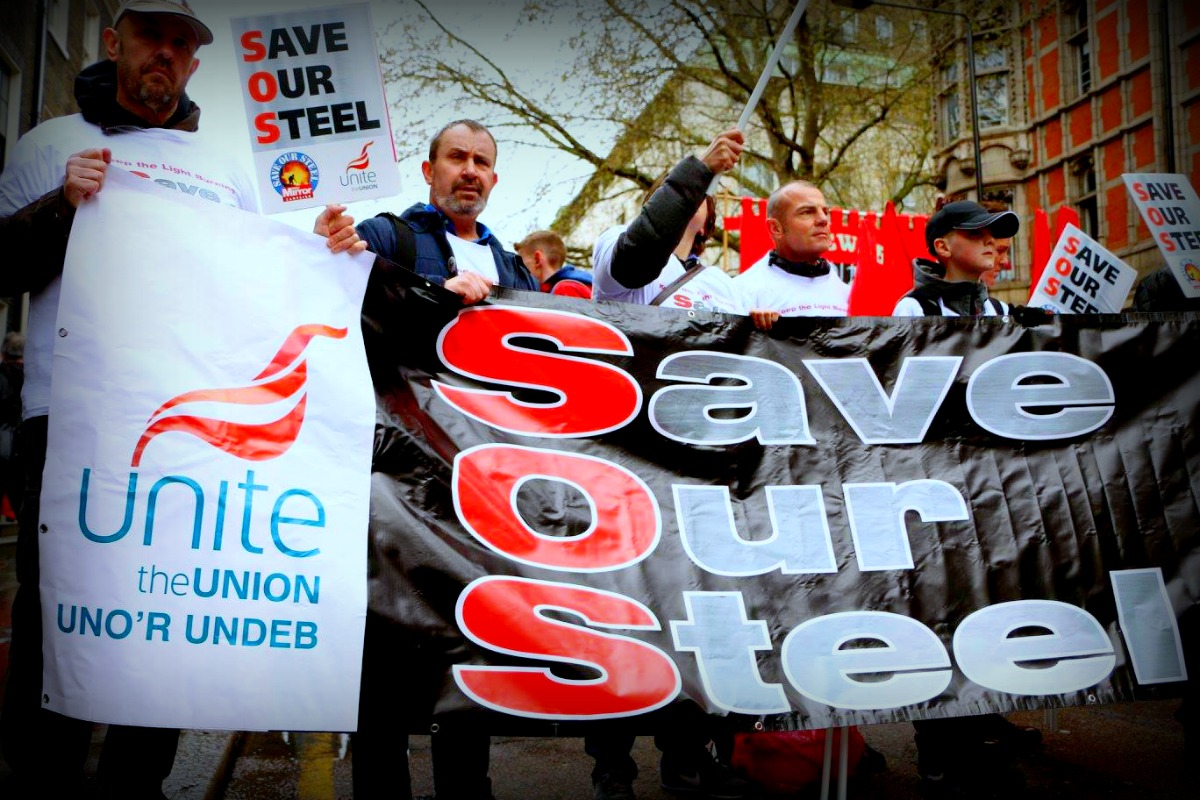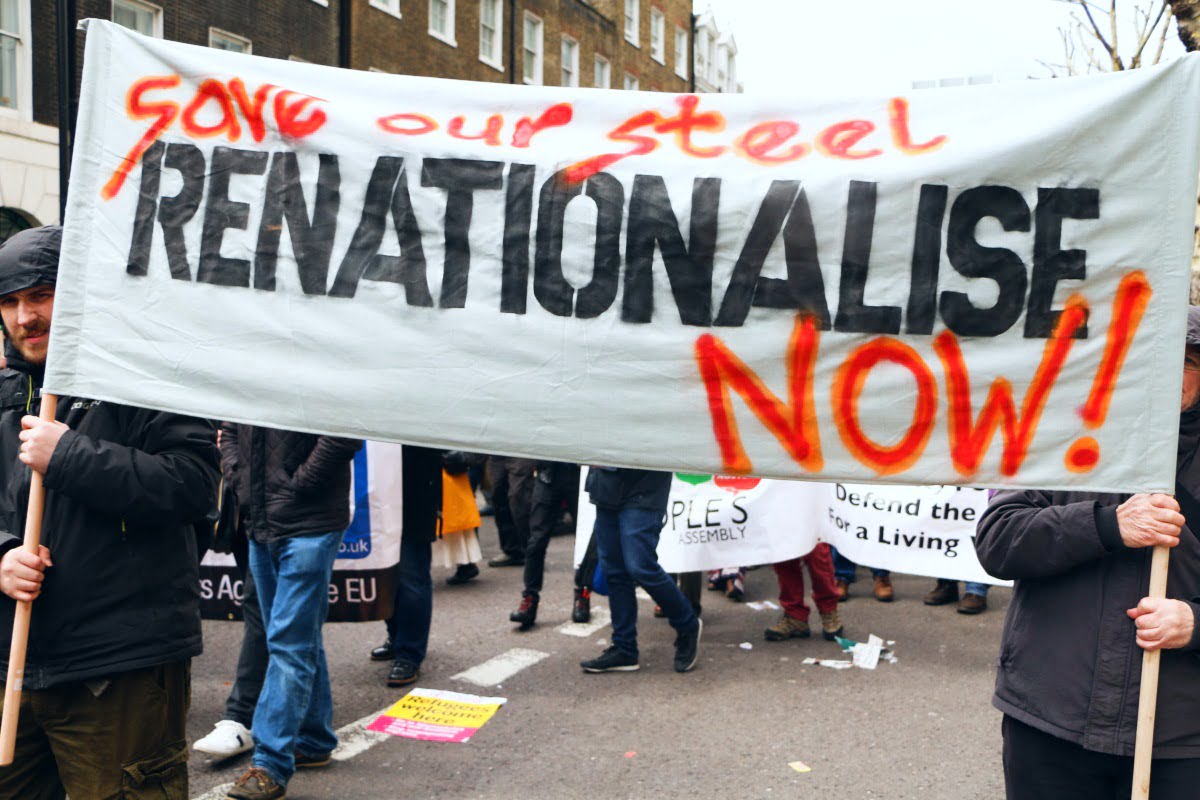Thousands of jobs are under threat in the UK’s steel industry as a result of British Steel’s collapse. We need immediate nationalisation – with no compensation to the capitalist vultures.
The announcement that British Steel, the UK’s second largest steel manufacturer, has entered insolvency will have come as no surprise to most. Nevertheless, it has stunned workers, particular in Scunthorpe (where 3,000 of its employees are based) and in Teesside.
5,000 jobs are directly at risk, with a further 20,000 workers in supply chains facing an uncertain future. Staff have already started being sacked within hours of the formal announcement.
British Steel was purchased from Tata in 2016 for a nominal £1 by ‘private equity’ firm Greybull Capital. Great promises to turn the ailing steel company around were made by parasitic investors at the time. Clearly these have come to nothing.
Collapse
 Tim Roache, general secretary of the GMB union, has stated that, “This is devastating news for the thousands of workers in Scunthorpe and across the UK.”
Tim Roache, general secretary of the GMB union, has stated that, “This is devastating news for the thousands of workers in Scunthorpe and across the UK.”
Unite the Union assistant general secretary Steve Turner also stated:
“While Brexit uncertainty has undoubtedly hit the steelmaker’s order book and high iron ore prices have increased operating costs, many steelworkers will be questioning how Greybull could find the finance to fund the acquisition of a French steel works last week while pushing British Steel to the brink of collapse.
“Greybull has a business model and history of collapsing successful businesses to line its own pockets. If it thinks it is going to run off into the sun with tens of millions of pounds after allowing the collapse of British Steel into administration it can dream on.”
However, under the Tories, that may well be what now happens.
Turner later added:
“Unite will also press for a full investigation into the financial engineering of Greybull that has left the taxpayer picking up the tab for a trail of corporate destruction which has wreaked havoc on the lives of working people.”
Writing in the Guardian, Nils Pratley summed up the situation well:
“Choose your villain in the British Steel crisis. The government has dithered for years about the future of steelmaking in the UK and has stumbled from one crisis to another. Or blame the unresolved Brexit pantomime in Westminster. Or point to the company’s private equity owner, Greybull Capital, whose past calamities include Monarch Airlines and electricals chain Comet.
“…When Monarch failed under Greybull’s ownership in 2017, taxpayers were landed with a £60m bill for repatriating 100,000 passengers. The private equity firm, by contrast, emerged as top creditor in the administration. There are questions of trust and credibility…The firm is charging interest on loans to British Steel at 9.6%, a princely rate.”
Incredibly, the Tory government loaned British Steel £120 million only a few weeks ago to get them out of a mess. Now the bosses want a further £75 million. The failure to obtain this credit has triggered the appointment of an official receiver to run the company.
Long-term decline
 The grim fate facing British Steel and its workers reflects the long-term decline of UK industry, manufacturing, and capitalism more widely. Britain was once the workshop of the world; now it is a hiding place for ruthless finance capital. Asset strippers like Greybull have been plundering the country’s resources for decades under the not-very-watchful eye of big business governments.
The grim fate facing British Steel and its workers reflects the long-term decline of UK industry, manufacturing, and capitalism more widely. Britain was once the workshop of the world; now it is a hiding place for ruthless finance capital. Asset strippers like Greybull have been plundering the country’s resources for decades under the not-very-watchful eye of big business governments.
Incredibly, Greybull charged British Steel £3 million a year in management fees. Apart from Monarch Airlines and Comet, Greybull has also shepherded firms like My Local and Rileys Snooker Hall towards administration, alway making money for themselves along the way. This is the real ugly face of capitalism.
Steel production – an important part of industrial production – has certainly had a chequered history over the last century in Britain. Under private ownership prior to 1945, it had struggled to advance at all, as owners put profit before investment (a reoccuring theme under capitalism).
The industry was duly targeted for nationalisation under the post-war Labour government. In the 1950s, the Tories sold it all back to their rich chums, with the state making a huge loss on the deal.
By the 1960s, however, low investment and poor productivity again obliged the Wilson Labour government to renationalise (in 1967), creating the British Steel Corporation. Despite nationalisation, this was run in the same way as a private company, except for the state picking up the bill. Workers were treated like dirt.
Following Thatcher’s win in 1979, British Steel set about sacking workers and closing sites to make it an ‘attractive’ proposition for privatisation. This finally went through in 1988. British Steel became Corus before, again facing crisis, it was taken over by Tata in 2007.
Hopes dashed
At every stage, the aim of the capitalist vultures and their pals in Westminster has been to asset strip whilst allowing the continued long process of decline.
This is how the British steel industry as arrived at its current crisis-ridden position. According to Rob Davies in the Guardian:
“The UK steel industry has been in decline for some time because of a variety of factors such as overcapacity in EU steelmaking and Chinese state-subsidised firms flooding the global market with cheap product. An industry that employed 323,000 people in 1971 now employs less than a tenth of that, at 31,900.”
Hopes that Tata might come to the rescue have been dashed, as the multinational firm is also struggling due to the same factors highlighted above.
The leaders of the labour movement must not place any further hopes in some sort of deal being cobbled together “in the national interest” at this late hour. Even if such a deal was to be formed, it would not provide any long-term hope for workers, but would be implemented simply to allow the likes of Greybull to continue to fill their pockets in the short term.
Nationalisation
 Labour leader Jeremy Corbyn has correctly come out and criticised the Tories and their fat-cat friends for allowing this situation to arise.
Labour leader Jeremy Corbyn has correctly come out and criticised the Tories and their fat-cat friends for allowing this situation to arise.
“Once again, our communities are being betrayed by a Tory government whose free market obsession is threatening Britain’s vital manufacturing base – just as they were under Margaret Thatcher,” Corbyn has asserted.
“If an agreement cannot be struck with British Steel, the government must act to take a public stake in the company to secure the long term future of the steelworks and protect peoples’ livelihoods and communities.”
This is the only way forward. Throwing more of our money at the accountants at Greybull is a criminal waste of time.
Labour should demand the immediate renationalisation not only of British Steel, but of the whole steel industry. The company books should be opened to examination by the trade unions, in order to see just where all the cash has gone.
And action should be taken to recover the £120 million pounds – and more – that has been pocketed by these private parasites. If they demand compensation for renationalisation, they can have their pound back in return.
If faced with closures and the sack, British Steel workers should occupy the plants and refuse to let the asset strippers in. This would send a clear message that workers are willing to fight for their jobs, and would inspire struggle in other threatened industries.
This militant tactic can have an impact across the labour movement. This was seen in cases such as the Visteon car plant occupation in Enfield, London, and the Vestas wind-turbine factory occupation on the Isle of Wight, both in 2009.
The important thing is to link the industrial struggle to a political one: that is, to demand nationalisation, and to fight for a socialist Labour government that will commit to public ownership over private profit.
Clause IV
 The British Steel scandal – and it is a scandal – shows once again the failure of privatisation and of the whole capitalist system. Carillion, it seems, was not a one-off but the norm.
The British Steel scandal – and it is a scandal – shows once again the failure of privatisation and of the whole capitalist system. Carillion, it seems, was not a one-off but the norm.
As such, Labour must fight to reverse all privatisations and carry out the words of the original Clause IV: to promise workers “the full fruits of their industry” through the “common ownership of the means of production, distribution, and exchange”.
In today’s terms, this means the nationalisation of the commanding heights of the economy – the major monopolies and banks. Instead of the bureaucratic top-down management of the past, these industries should be run under workers’ control, as part of a socialist plan of production.
This is the only way to preserve jobs and provide an economy that works for the many not the few.






